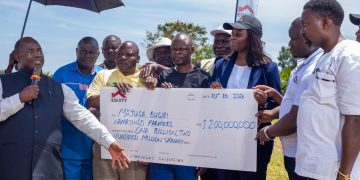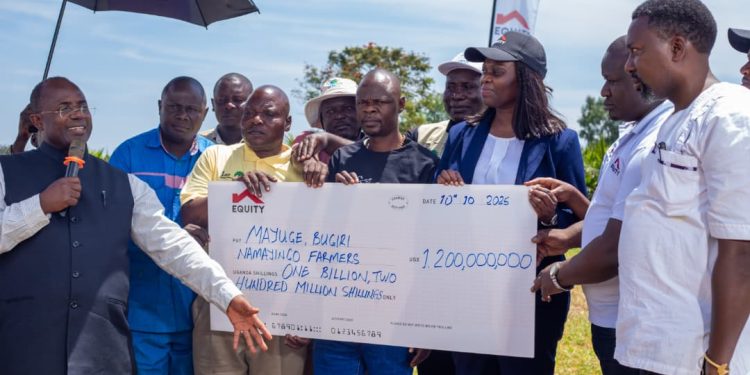MAYUGE — The Government of Uganda has officially launched the National Oil Palm Project (NOPP) in the districts of Mayuge, Namayingo, and Bugiri — a milestone aimed at transforming agriculture and improving community livelihoods across the Busoga sub-region.
The event, held on Friday at Mayuge District Headquarters, was presided over by the State Minister for Agriculture, Animal Industry and Fisheries, Hon. Fred Bwino Kyakulaga, who reaffirmed the government’s commitment to agricultural transformation and poverty alleviation.
“This move is going to go a long way in transforming the people of Busoga from the chronic poverty which has affected them for so long,” Hon. Kyakulaga said. “Uganda alone, even without exporting, already has a ready market for palm oil, soap, cosmetics, and other products. Each farmer will earn about UGX 2.5 million monthly at harvest for up to 30 years. The government has truly answered the Busoga poverty and job crisis with this project.”
The National Oil Palm Project, financed through a loan from the International Fund for Agricultural Development (IFAD), is designed to promote sustainable commercial agriculture, create jobs, and reduce poverty.
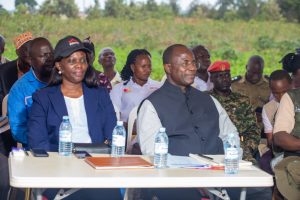
Under this initiative, the government appointed Equity Bank Uganda as the Fund Manager to oversee the credit facility, manage disbursements, and build the financial capacity of smallholder farmers.
“It is an honour for Equity Bank to partner with the Ministry of Agriculture and IFAD on this transformative project,” said Catherine Psomgen, the Bank’s Director for Public Sector and Social Investments. “As the designated fund manager, our role is not just to disburse money, but to build trust, ensure efficiency, and promote sustainable growth.”
Psomgen revealed that in under two years, Equity Bank has extended UGX 1.23 billion to 896 farmers across the three pilot districts. The financing has enabled farmers to access quality seedlings, pesticides, and fertilisers, as well as training in best agricultural practices.
“We employ modern banking systems to track every transaction, verify beneficiaries, and ensure that funds reach genuine oil palm farmers in record time,” she said. “This has minimised risk and built accountability throughout the project.”
Farmers participating in the project are expected to have at least five hectares of land, with each eligible for up to UGX 25 million in financing. Those with smaller land sizes can access proportional support. However, not all funds are disbursed directly to the farmers — part of the financing goes to vetted suppliers who provide inputs and technical support to ensure proper implementation.
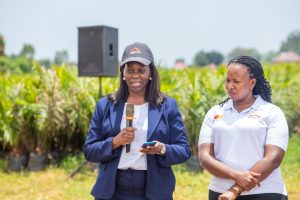
Psomgen emphasised Equity Bank’s broader agricultural commitment through its Africa Resilience and Recovery Plan, under which 30% of the Bank’s loan portfolio is dedicated to food and agriculture.
“We believe that when we empower farmers, we empower communities,” she said. “Farming is not just work — it is hope in action. Every seed planted is a dream, and every harvest is a reward for faith, patience, and dedication.”
Phase One of the project covers Buvuma, Mayuge, Bugiri, and Namayingo districts, with Kamuli, Iganga, Jinja City, Bugweri, Namutumba, Luuka, and Kaliro scheduled for inclusion next year.
The Minister noted that beyond oil palm cultivation, the government is also supporting alternative livelihoods such as aquaculture and piggery to ensure that non-participating community members also benefit from the project.
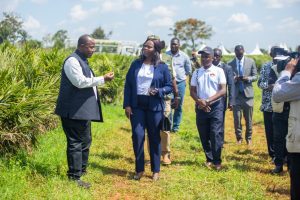
“This is not just about growing oil palm,” Hon. Kyakulaga said. “It’s about uplifting every household within these communities.”
Equity Bank reaffirmed its commitment to walking with farmers “from farm to market,” ensuring that every Ugandan farmer under the project benefits from both financial and technical support.
“Together with the Government of Uganda, development partners, and farmers, we will make this initiative a shining example of how collaboration can transform the agricultural landscape in our country,” Psomgen concluded.
